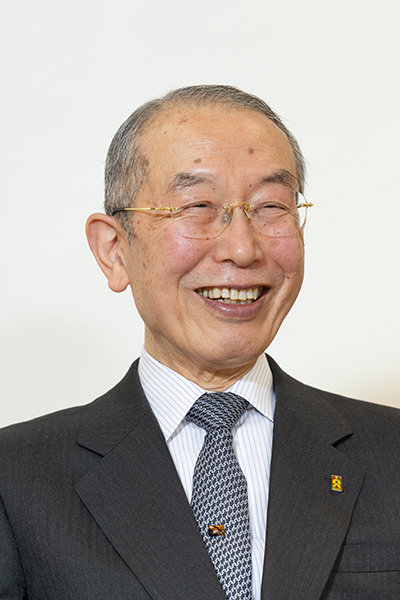Nurtured by Encounters—The Mind of Reverence and the Mind of Humility, Part 1
November 2024

Developing the Mind of Reverence
About a year ago, when I offered my “Guidelines for Members’ Practice of the Faith” for this year, I cited these words of Masahiro Yasuoka (1898–1983): “The most important thing, for the improvement of humanity, is developing the mind of reverence and knowing humility.” The mind that aspires to greatness is important not only for people of faith, but for all people. No less important is mutual respect between human beings because it is the basis for a peaceful society.
However, as I have mentioned before, those who cannot revere themselves are said to be unable to revere others. Indeed, were I to be asked if I revere myself, my honest reply would be that I find it very difficult.
And yet, as I have also said many times before, in my home, we pay homage with our palms pressed together reverently to a statue of the Buddha, who also has his palms pressed together reverently, which makes me realize that I am worthy of respect. Every morning and every night, when I face the Buddha and pay homage with my palms pressed together reverently, I humbly reflect upon the fact that the Buddha also reveres me.
This year, for my New Year’s calligraphy, I wrote, with ink and brush, ikei [畏敬], a word meaning “in awe.” Of course, I did so because I think the mind of reverence is important. However, when we think about what we are in awe of, forms of existence and forces at work come to mind that are far beyond human knowledge and capability, such as the gods and the buddhas, the universe, and nature. Such awe may include having the mind of reverence for saints, sages, and great figures of history, but at the same time, I think that the people and things we come into contact with on a daily basis—every one of our encounters—can also be objects of our awe, as the mind of reverence can only be cultivated in the course of our daily lives.
Encounters Are Nourishment for the Mind
One example of this is the case of parents and children. A parent often thinks their one-sided point of view is correct, so they scold their children. Perhaps this is why, since time immemorial, it has been said that fostering the mind of reverence between parents and children is difficult to do, and even the Chinese philosopher Mencius (372–289 BCE) advised, “Parents, do not teach your children.” I believe that even though parents are parents and children are children, they nevertheless have their own identities and are different from one other. Therefore, it is important that parents show respect for their children’s identities when they interact with them. That way, children will also show respect for their parents’ identities and try to understand what their parents are telling them. Indeed, for parents and their children to have a good relationship and see eye to eye, parents must respect their children’s identities. Furthermore, parents should never forget the mental attitude of “words matching deeds,” so that there is no discrepancy between what they say and what they do, which I think is a good way to foster the mind of reverence between parents and children.
We tend to think that being reverent means being attentive only to things that are “superior” to us. However, people who are on the same level as us, or who are younger or have less experience than we do, are also important for fostering our mind of reverence. And this is the same in the case of couples or friends. The important thing is that we recognize the identity of the other person and that we are receptive to that person’s strengths and virtues, praising and emulating them, because doing so fosters the mind of reverence in ourselves and others. I think that when we accept people in this way, every encounter becomes nourishment for fostering the mind of reverence, which comports with the Bodhisattva Never Unworthy of Respect’s practice of revering others.
Konosuke Matsushita (1894–1989), the founder of Panasonic, who is called “the God of Management,” said, “If you have the mind of reverence for natural phenomena and this world, there are countless things worth revering,” (Michi o hiraku [Opening the way], PHP Institute, 1965). Moreover, he stated that “Human beings have been given the capability to find something of value, worthy of revering, in all things and all people,” and he calls on us to put that capability to use and together refine our minds of reverence (Matsushita 1965).
However, as Masahiro Yasuoka tells us, “Once you develop the mind of reverence, you will certainly reflect upon your own relatively humble reality and give rise to the mind of humility.” So encounters also foster another important mental attitude—knowing humility. In next month’s issue, let’s think about the mind of humility as well as the significance of sharing the Dharma with others, which for us is a very important kind of encounter.




